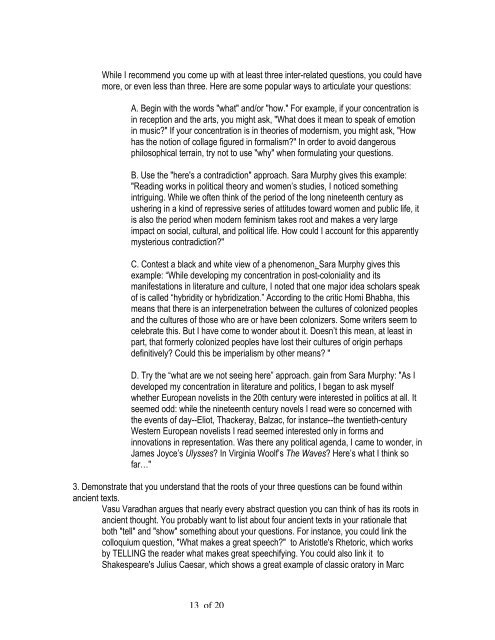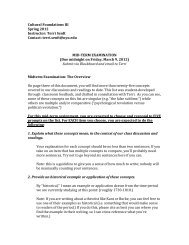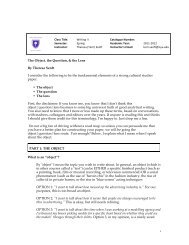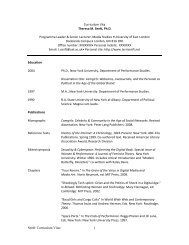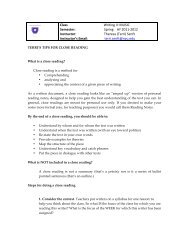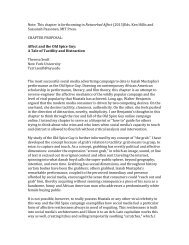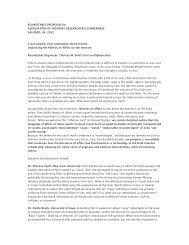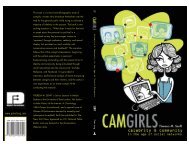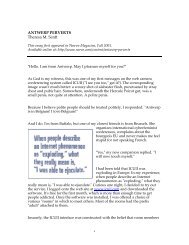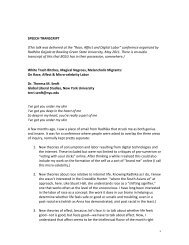New York University Gallatin School of Individualized ... - Terri Senft
New York University Gallatin School of Individualized ... - Terri Senft
New York University Gallatin School of Individualized ... - Terri Senft
You also want an ePaper? Increase the reach of your titles
YUMPU automatically turns print PDFs into web optimized ePapers that Google loves.
While I recommend you come up with at least three inter-related questions, you could have<br />
more, or even less than three. Here are some popular ways to articulate your questions:<br />
A. Begin with the words "what" and/or "how." For example, if your concentration is<br />
in reception and the arts, you might ask, "What does it mean to speak <strong>of</strong> emotion<br />
in music?" If your concentration is in theories <strong>of</strong> modernism, you might ask, "How<br />
has the notion <strong>of</strong> collage figured in formalism?" In order to avoid dangerous<br />
philosophical terrain, try not to use "why" when formulating your questions.<br />
B. Use the "here's a contradiction" approach. Sara Murphy gives this example:<br />
"Reading works in political theory and women’s studies, I noticed something<br />
intriguing. While we <strong>of</strong>ten think <strong>of</strong> the period <strong>of</strong> the long nineteenth century as<br />
ushering in a kind <strong>of</strong> repressive series <strong>of</strong> attitudes toward women and public life, it<br />
is also the period when modern feminism takes root and makes a very large<br />
impact on social, cultural, and political life. How could I account for this apparently<br />
mysterious contradiction?"<br />
C. Contest a black and white view <strong>of</strong> a phenomenon. Sara Murphy gives this<br />
example: “While developing my concentration in post-coloniality and its<br />
manifestations in literature and culture, I noted that one major idea scholars speak<br />
<strong>of</strong> is called “hybridity or hybridization.” According to the critic Homi Bhabha, this<br />
means that there is an interpenetration between the cultures <strong>of</strong> colonized peoples<br />
and the cultures <strong>of</strong> those who are or have been colonizers. Some writers seem to<br />
celebrate this. But I have come to wonder about it. Doesn’t this mean, at least in<br />
part, that formerly colonized peoples have lost their cultures <strong>of</strong> origin perhaps<br />
definitively? Could this be imperialism by other means? "<br />
D. Try the “what are we not seeing here” approach. gain from Sara Murphy: "As I<br />
developed my concentration in literature and politics, I began to ask myself<br />
whether European novelists in the 20th century were interested in politics at all. It<br />
seemed odd: while the nineteenth century novels I read were so concerned with<br />
the events <strong>of</strong> day--Eliot, Thackeray, Balzac, for instance--the twentieth-century<br />
Western European novelists I read seemed interested only in forms and<br />
innovations in representation. Was there any political agenda, I came to wonder, in<br />
James Joyce’s Ulysses? In Virginia Woolf’s The Waves? Here’s what I think so<br />
far…"<br />
3. Demonstrate that you understand that the roots <strong>of</strong> your three questions can be found within<br />
ancient texts.<br />
Vasu Varadhan argues that nearly every abstract question you can think <strong>of</strong> has its roots in<br />
ancient thought. You probably want to list about four ancient texts in your rationale that<br />
both "tell" and "show" something about your questions. For instance, you could link the<br />
colloquium question, "What makes a great speech?" to Aristotle's Rhetoric, which works<br />
by TELLING the reader what makes great speechifying. You could also link it to<br />
Shakespeare's Julius Caesar, which shows a great example <strong>of</strong> classic oratory in Marc<br />
13 <strong>of</strong> 20


